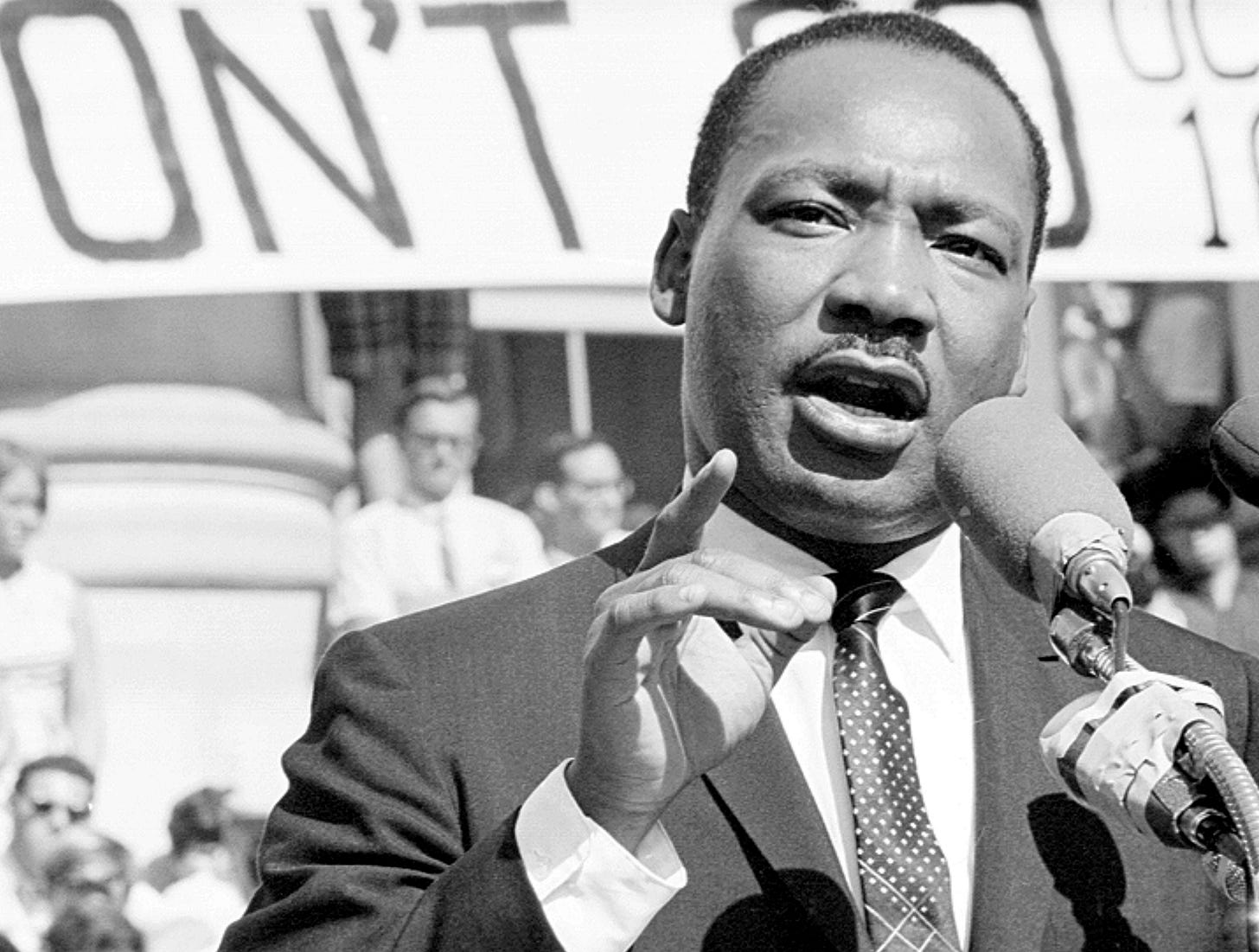
Were he alive today, on the federal holiday celebrating his contributions to civil rights, Martin Luther King would be 93 years old.
Today’s federal holiday was established 15 years after King was assassinated. (The first proposal to turn his birthday into a holiday came just four days after he was killed, from Rep. John Conyers.) Even though the holiday became law in 1983—and you can read a bit about the many fights over its passage here—it wasn’t celebrated until 1986, because of a clause in the legislation that delayed its implementation for two years—perhaps as a gesture to those who argued it would be too disruptive to business for the holiday to start right away.
In the final votes on the bill, 77 House Republicans and 14 House Democrats voted no, as did 18 Senate Republicans and 4 Senate Democrats. Of course, the Jesse Helmses of the day were opposed to the holiday, but so were some Republicans whose names you may recognize from the politics of recent years: John McCain, Chuck Grassley, Orrin Hatch. Each of those three men came to regret their no votes.
By contrast, the bill to observe Juneteenth as a federal holiday, which was first proposed in 1996, was enacted last year after passing unanimously in the Senate and overwhelmingly in the House. All 14 no votes were from Republicans. It was celebrated the same year—in fact, its first observance was the day after it was signed into law.
You’ll sometimes hear it claimed that, if Martin Luther King Jr. were alive today, he would be a Republican. In part, that claim is based on the notion that King would have opposed affirmative action, since he spoke so eloquently in his “I Have a Dream” speech of his hope that people would be judged by “the content of their character rather than the color of their skin.” But to claim on that basis that MLK would have been a Republican is a gross example of taking someone’s life and ideas out of context.
The notion of a GOP MLK can also be traced back to King’s niece, Alveda King, who has become a mainstay in the pro-life movement. After having had abortions of her own, Alveda King switched parties, was born again, and later denounced King’s widow, Coretta Scott King, for her stance on abortion. Alveda King has explicitly claimed that her uncle actually was a Republican during his lifetime, which has led other Republicans to repeat that falsehood.
The reality is that there is no evidence that King was a Republican. He found allies among the members of both major parties, but also found much to dislike in each party and was a thorn in the side of both Democratic and Republican leaders. In a 1956 speech on desegregation, he lambasted both parties:
Actually, the Negro has been betrayed by both the Republican and the Democratic Party. The Democrats have betrayed him by capitulating to the whims and caprices of the southern Dixiecrats. The Republicans have betrayed him by capitulating to the blatant hypocrisy of reactionary right-wing northern Republicans. And this coalition of southern Dixiecrats and right-wing reactionary northern Republicans defeats every bill and every move towards liberal legislation in the area of civil rights. And if we are not careful, the same thing will happen in the next few days when Congress reconvenes. Nothing will be done about the filibuster and all of these other things that prevent any real move in the area of civil rights. We must be concerned enough all over this nation and demand that the federal government will become more aggressive, will rise up and take a stand and stop being so quiet and do something about the conditions which so many citizens of the South are confronting today.
Even more explicitly, he wrote in 1958: “I don’t think the Republican party is a party full of the almighty God nor is the Democratic party. They both have weaknesses. And I’m not inextricably bound to either party.” There is little in the record of the remaining decade of King’s life—during the years when Congress debated the Civil Rights Act, the Voting Rights Act, and other civil rights legislation—to suggest that he would have been comfortable affiliating with either major party.
Today, Martin Luther King III and other members of the King family plan on leading a march across Washington’s beautiful new Frederick Douglass bridge, urging Congress to pass some version of the election-related bills now before it. “We’re directly calling on Congress,” he said, “not to pay lip service to my father’s ideals without doing the very thing that would protect his legacy: pass voting rights legislation.” Later this week, another march in Washington, the March for Life, is likely also to see MLK’s name and image invoked on signs and in speeches; it’s not uncommon at the annual march to see his famous line about how “injustice anywhere is a threat to justice everywhere” on placards.
As implausible as it is that Martin Luther King Jr. would have been entirely comfortable with either party in his day—let alone in ours—there is nevertheless something strangely heartening about the fact that so many members of both parties now feel comfortable claiming him as an inspiration, even if in doing so they only pick and choose from his words and deeds.
But for those of us interested in thinking more seriously about King and his legacy, including about the controversial and overlooked parts of his political career, this annual holiday is a good occasion to seek to understand him more fully, not to shine a light on just one facet of what we hope he was or would be today. Make some time this day to read King’s letters and speeches—and not just his most famous ones—at the King Institute website.




